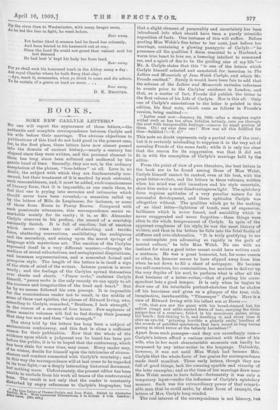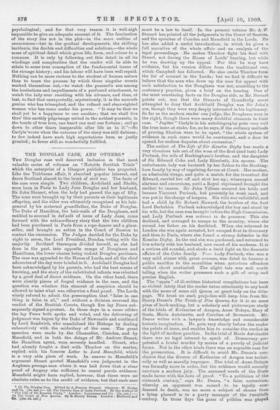BOOKS.
SOME NEW CARLYLE LETTERS.* No one will regret the appearance of these letters,—the authentic and complete correspondence between Carlyle and his wife before their marriage. The obvious objections to Publications of this kind do not hold good in the present case, for, in the first place, these letters have now almost passed into the domain of ancient history,—nearly a century has elapsed since they were written, and the personal element in thorn has long since been softened and mellowed by the gentle hand of time. Secondly, they are not, in the ordinary acceptation of the phrase, " love-letters " at all. Love is, no doubt, the subject with which they are fundamentally con- cerned, but their treatment of it is marked by such restraint, such reasonableness, and, it must be added, such consciousness of literary form, that it is impossible, as one reads them, to feel that one is prying into secreciea and intimacies which Should never have been revealed,—a sensation called up by the letters of Mlle. do Lespinasse, for instance, or some of those from Keats to Fanny Brawn. Compared with Such passionate utterances, this correspondence seems re- markable mainly for its sanity ; it is, as Mr. Alexander Carlyle observes in his preface, the record of a courtship eminently Scotch. It is full of emotion, but of emotion Which never rises into an all-absorbing and terrific force, shattering conventions, annihilating the ambiguous and the secondary, and seizing upon tho secret springs of language with mysterious art. The emotion of the Carlyles exPresaed itself in a very different manner,—through the medium of moral exhortations, and metaphysical disquisitions, and immense argumentations, and a somewhat formal and Pompous style. The length of the letters is in itself a sign Of the state of mind of the writers. Intense passion is never Wordy; and the feelings of the Carlyles spread themselves over sheets and sheets. ".Pauca verba," exclaims Carlyle himself, "pauca verba is the only remedy we can apply to all the excesses and irregularities of the head and heart." But lie by no means followed his own precept. It is impossible for the conscientious reader not to recall, in the middle of some of these vast epistles, the phrase of Edward Irving, who, according to Carlyle, remarked, " Brothern, I lack strength," in the course of a sermon of four hours. Few explorers of these massive volumes will fail to feel during their journey that they too now and then "lack strength."
The Story told by the letters has long been a subject of acrimonious controversy, and this fact is alone a sufficient reason for their publication. Now that the whole of the !vidence upon which a judgment can be based has been put _before the public, it is to be hoped that the controversy, which bail been stale for some time, may cease. Every reader may, lf he wishes, decide for himself upon the intricacies of circum- !tances and conduct connected with Carlyle's courtship; and
this way the correspondence will at last come to be regarded 1.12)1 its true light,—as a deeply interesting historical document, ut nothing more. Unfortunately, the present editor has been linable to exclude from his work all traces of the controversial ne- The result is not only that the reader is constantly aiaturbed by angry references to Carlyle's biographer, but _rfie Lone Letters of 3'hoetas Carlyle and Jena Welsh. Edited by Alexander Id.A. With numerous Illuetratione, 2 in Colour. 2 vols. LOndost '"un "Alma that a slight element of personality and uncertainty has been introduced into what should have been a purely scientific exposition of facts. One instance of this will suffice. Before quoting Miss Welsh's fine letter to her aunt, just before her marriage, containing a glowing panegyric of Carlyle—" he possesses all the qualities I deem essential to a Husband, a warm true heart to love me, a towering intellect to command me, and a spirit of fire to be the guiding star Of my life"— Mr. A. Carlyle states that this "is one of the letters which Carlyle himself selected and annotated. for insertion in The Letters and Memorials of Jane Welsh. Carlyle, and which Mr. Froude omitted." Surely it would have been fair to add that
the scheme of the Letters and .Memorials excludes reference
to events prior to the Carlyles' residence in London, and that, as a matter of fact, Froude did publish. the letter in
the first volume of his Life of Carlyle. Nor is this all. Only one of Carlyle's annotations to the letter is printed in this edition, his final note, which runs as follows in Froude's version, being omitted :— " Letter read now—January 24, 1808—after a sleepless night withal such as has too often befallen latterly, cuts me through the soul with inexpressible feelings—remorse no email portion of them. Ohm! my ever dear ono ! How was all this fulfilled for thee—fulfilled ! l—T. C."
This note no doubt represents only a partial view of the case; but it is certainly misleading to suppress it in the very act of accusing Froude of the same fault; while it is only too clear that the reason for its suppression was that it did not fit in with the conception of Carlyle's marriage held by the editor.
From the point of view of pure literature, the best letters in the book are to be found among those of Miss Welsh.
Carlyle himself cannot be ranked, even at his best, with the groat letter-writers, and the letters in these volumes, written when his mind was still immature and his style uncertain, show him under a mostdiaad-antmigeouslighmt. The epistolary form requires aptitudes of a very peculiar nature for its successful development, and these aptitudes Carlyle was altogether without. The qualities which go to the making of an ideal letter—lightness of touch, ease of expression, brilliance which is never forced, and amiability which is never exaggerated and never forgotten—these things were alien to the whole temperament of Carlyle. In spite of the apparent roughness of his style, he was the most literary of writers, and thus in his letters he falls into the fatal faults of
stiffness and over-elaboration. "It is truly gratifying to me to contemplate you advancing BO rapidly in the path of mental culture," he tells Miss Welsh. No one with an instinct for what a good letter meant could have written such a sentence. He was a great humorist, but, for some reason or other, his humour seems to have slipped away from him when he sat down to fill a sheet of notepaper. He became too self-conscious, too conscientious, too anxious to deliver up the very depths of his soul, to perform what is after all the first business of a letter-writer,—that of putting his corre- spondent into a good temper. It is only when he begins to draw one of his inimitable portrait-sketches that he shakes off his heaviness and gives us a glimpse of the true, rich, imaginative, inexhaustible, " Titanesque " Carlyle. Here is a
view of Edward Irving with his infant son at Dover :—
" Oh, that you saw the giant with his broad-rimmed hat, his sallow visage and sable matted fleece of hair, carrying the littlo pepper-box of a creature, folded in his monstrous palms, along the beach tick-ticking to it, and dandling it, and every time it stirs an eye-lid, ' grinning horrible a ghastly smile; heedless of the crowds of petrified spectators, that turn round in long trains gazing in silent terror at the fatherly Leviathan!"
Apart from such passages—and they are exceedingly rare- Carlylo's letters afford a curious contrast with those of his wife, who in her most characteristic moments can hardly be surpassed by any letter-writer in the language. Unluckily, however, it was not until Miss Welsh had become Mrs. Carlyle that the whole force of her genius for correspondence made itself manifest. These early letters, though they are full of good things, lack the amazing sparkle and vivacity of
the later examples; and as the time of her marriage drew near Miss Welsh seems to have fallen—fortunately it was only a temporary lapse—under the influence of Carlyle's epistolary manner. Such was the extraordinary power of that reinark- able man that lie could make, by sheer force of example, the
letters of Mrs. Carlyle longwinded.
The real interest of the correspondence is not literary, bnb psychological; and for that very reason it is well-nigh impossible to give an adequate account of it. The fascination of the story lies not in the plot—in the mere outline of occurrences—but in the gradual developments, the shifting incidents, the doubts and difficulties and solutions,—the whole mass of spiritual detail which gives life, form, and colour to a romance. It is only by following out this detail in all its windings and complexities that the reader will be able to attain to some true conception of the fundamental issues of the strange history ; and his labour will have been well repaid. Nothing can be more curious to the student of human nature than to trace the process by which these singular events worked themselves out,—to watch the peasant's son among the hesitations and impedimenta of a profound attachment, to watch the lady ever recoiling with his advance, and then, at last, to find that unexpectedly, mysteriously, it is the uncouth genius who has triumphed, and the refined and clear-sighted woman who has come under his power. "It may be that we shall yet be a happiness to one another; that we shall live thre this .earthly pilgrimage united in the noblest pursuits, in the bonds of true love, one heart one soul one fortune ; and go down to other times inseparable after life as in it."—So Carlylewrote when the outcome of the story was still dubious ; to few indeed have such high expectations been so justly granted; to fewer still so wonderfully fulfilled.







































 Previous page
Previous page